- Home
- Clive Barker
Days of Magic, Nights of War Page 17
Days of Magic, Nights of War Read online
Page 17
“I do . . .” Malingo said quietly, sounding a little surprised at himself.
“Hang on, now!”
They were coming to the edge of the Carnival, where the brightly lit boardwalk gave way to murk and mud, and thence to a rocky landscape which rolled away toward the sea.
Their flight had carried them north, he judged; the sky was darker over the straits that lay ahead than they had been behind them. Evening was turning to Night.
“Where exactly are we going?” he yelled over the rushing of the wind, which became steadily louder as they sped toward the coastline.
“You’ll find out in a few moments,” the woman in the robe yelled back. “Get ready! We’ve got some tricky maneuvering ahead of us. It may get a little bumpy.”
Malingo peered a second time through the snapping folds of his carrier and instantly regretted that he’d done so. They were speeding toward a solid rock face.
“What are you doing?” he hollered. “You’ll kill us!”
“Then don’t look!” the woman said. “Keep holding tight!”
Malingo couldn’t keep himself from looking, despite the woman’s advice. They flew directly toward solid rock at a speed that surely meant they would be splattered against it, but at the last moment the spirit in the fabric swerved and carried them through the narrowest of fissures in the rock. His bearer knew her way. She speeded him through the crack in the rock without incident, though at times it seemed to get so tight he was sure they wouldn’t make it. Still he clung to the cloth—what choice did he have?—and he was finally rewarded with the sweetest smell imaginable: the clean smell of salt sea air.
“Take courage!” the woman in the robe announced. “We’re almost there!” and a few seconds later they started to slow down. Emerging at last from the fissure, they came to rest on a wet rock.
“Be careful now,” the woman warned. “I don’t want you to get swept away.”
She had brought them down to a spot that was no more than three or four yards from the sea, and the waves beat against the boulders in a white frenzy. Within a few seconds of coming to land, Malingo was soaked from head to foot.
“That’s cold,” he said.
“A little seawater isn’t going to hurt you,” said the old woman, and as she spoke blue fabric parted and she stepped out of new folds, her occupying spirit becoming solid and visible. She was old, perhaps very old, her unpinned hair rising around her head as the wind caught it. “Lordy Lou, geshrat,” she said. “That was hard work. You’re heavier than you look.”
“Well, thank you for the rescue,” Malingo said. “But why?”
“Well, I didn’t do it for the good of my health,” she replied. “Or yours, come to that. I did it for—”
“Let me guess: Candy Quackenbush.”
“Very good, geshrat.”
“If it’s any comfort to you, I would die for that lady.”
“It is a comfort,” said the old woman. “And believe me, I know that you would. That’s why I’m sending you after her now. To prevent a double tragedy.”
“That doesn’t sound good.”
“It isn’t,” the old lady said. “But time is of the essence, so can we hurry along?”
“Hurry where?”
“Turn around.”
He turned and saw that in the blue murk there was a small two-masted vessel, which was being kept from dashing itself against the shore by the crew, who were wielding lengths of roughly hewn timber to prevent the ship from being carried against the rocks.
“Quickly! Quickly!” the woman in the blue robe said, directing Malingo to a plank that lay between land and boat. He gave her a doubting look. The plank was narrow and slick with water. But the old lady hurried Malingo across it so quickly his doubts were over in a heartbeat, and he was received into the beaming company of a young woman with dark skin and bright orange hair. Beside her was a third woman, fine boned but severe. She had a coat for him, which was certainly welcome.
“Let’s go below and get you some nourishment,” she said, a suggestion with which Malingo gladly complied. The women led him down into the hold of the ship, where a large fire was burning in an enormous iron grate. Malingo was offered a chair, but he said he preferred to sit near the hearth. The room quickly filled with the pungent smell of drying geshrat. The promised nourishment quickly came in the form of a four-decker sandwich made of slices of well-seasoned ropa-ropa and jabal pâté. Malingo was halfway through the sandwich when the old woman—now wearing clean, dry robes—came back in and sat in one of the chairs close to the fire.
“Better now?”
“Much,” Malingo said. He set down his sandwich. “You’re Diamanda, aren’t you? Of the Fantomaya?”
“I am.”
“And you”—he pointed to the woman who’d given him the coat—“you must be Joephi, yes? And you Mespa, yes?”
“All correct,” said Mespa.
“Is that all Candy told you: our names?” said Joephi.
“She didn’t say much more,” Malingo replied. “She’s a complicated one, that girl. She goes deep. I don’t even think she understands the mysteries she contains.”
“I doubt anybody does,” Diamanda replied with great gravity.
“We’d been traveling together for almost eight weeks,” Malingo went on, “and I was beginning to think we would stay together, but then she goes and runs off the way she did.”
“She was protecting you,” said Mespa.
“But that’s a two-way street. She protects me, and I protect her. How can I possibly protect her if I don’t know where she is?”
“You’ll find her again,” Diamanda said. “Your story together has a long way to go.”
“Yes?” said Malingo, so relieved to hear this that tears welled in his eyes.
“Absolutely,” said Diamanda. “Tell us now, did she display a good command of magic?”
“Not as much as she wanted to,” Malingo said. “She knew I’d learned some minor conjurations from Wolfswinkel, and she was always pushing me to teach her what I knew.”
“And did you?”
“No. I resisted for a long while. And then, once I agreed to do it, the opportunity was snatched away.”
“Why did you resist?” Mespa wanted to know.
“It’s as I said: she goes deep. I was afraid of what I might unleash in her. I didn’t know how she’d end up if she got real power.”
Diamanda sighed. “None of us do, Mister Malingo,” she said, with a note of quiet unease.
“Not even Candy?” said Malingo.
“Especially not Candy.”
“I think we can be certain of one thing,” Joephi said. “Whatever she learns, whatever she becomes, she will affect the fate of these islands in ways we can none of us begin to know.”
“So what do you want me to do? Besides find her.”
“That entirely depends on how things have changed for her when you do find her.”
“Am I going on my own?”
“On the first part of the voyage, yes,” Joephi said. “But once you get to the Nonce, you’ll hook up with a group of fine, good people.”
“Can’t you come with me?”
“We wish we could,” said Mespa. “But events are hurrying us all along in different directions, I’m afraid.”
“So it falls to you to find her, with the greatest possible speed, and bring her to a place of safety,” Joephi told him.
“What place?”
Diamanda shook her head. “I don’t know right now,” she said, her voice raw with despair. “What we tell you now might not be true in half an hour. There are strange things happening on just about every island, Malingo. Powers stirring that we had hoped never to see the likes of again. Things rising out of the deep. Things dropping out of the high heavens. There are no certainties, I’m afraid. None. No places of safety, no things we know to be true now that will be true in the next heartbeat.”
Malingo looked grim. “Can I ask—?” he murmured, t
hen stopped.
“Say it,” Diamanda told him. “If you’ve got a question, ask it now. There may not be another time.”
“Well, as you put it that way,” Malingo said. “What’s the worst thing that could happen?”
Diamanda sighed heavily. “I’m afraid that’s all too easy to answer,” she said. She glanced at her sisters, then back at Malingo. “The Twenty-Fifth Hour is where our enemies will attempt to strike. If they put that Hour in jeopardy, then our very existence will be in question.”
“They could do that?” Malingo said. “They could take the Twenty-Fifth Hour?”
“In sufficient numbers,” said Diamanda, “and with the right kind of strategy, yes. Let’s be in no doubt: the forces assembling against us are formidable. Mater Motley has been creating an army of stitchlings for years, hidden by the darkness of Midnight. If she unleashes them, and Odom’s Spire falls to her army—if the mysteries that the Twenty-Fifth Hour contain become vulnerable to attack and desecration—then the way we live our lives—both here and in the Hereafter—will be destroyed forever. A profound chaos will descend, and everything that made life possible in these islands—all the joy, all the love, all the meaning—will be extinguished. It would be as though we—and our world—had never existed.”
Malingo put his head in his hands. Though he was close to the fire, he was suddenly deathly cold.
“How’s that possible?” he said. “All these terrible things going on and nobody even knows.” He lifted his head a little. “Listen!” he said. “You can hear the Carnival music from here! Tens of thousands of people dancing and singing and . . . all ignorant.”
“Oh, they know,” said Diamanda. “People across the Hours have known for a long while now that matters of great consequence are in the air. They’ve woken from their slumbers, weeping and afraid, and they’ve not known why. They’ve been moved to kiss their children, suddenly, as though they feared they might not see them again.”
“Yet they don’t speak up about it,” Malingo said.
“A few have,” Joephi said. “But Houlihan took care of most of them. They disappeared, suddenly.”
“Terrible,” Malingo said.
“As for the rest—the ordinary men and women of the Hours—they just have to live their lives. Love their children. Grow old peacefully. So they turn their backs on what they suspect.”
“Is there any hope?”
“Of course there’s hope, geshrat,” Diamanda said fiercely. “But you have work to do. I’ll leave you in the company of my sister Mespa. She has her instructions. It’s been a pleasure talking with you, Malingo Geshrat. Joephi, would you come with me? We have a great deal to do.”
The two women left, and for a moment or two Malingo stared into the fire, meditating on the conversation they’d just had. Finally Mespa said: “Whenever you’re ready, my Captain . . .”
“I’m sorry?” Malingo said. “Your what?”
“It was Diamanda’s instruction,” Mespa explained. “You are to be Captain of this ship. It’s called the Lud Limbo.”
“Why me?”
“Because Diamanda trusts you.”
“But I don’t know how to captain a ship.”
“Well then, you’ll learn as we go, yes? Candy has faith in you and so do we. Do you want to come up on deck?”
They headed up into the soft starlight. There were lanterns lit everywhere around the vessel, and the flames illuminated a great crowd of folks, some human, many not, assembled in the middle of the deck. As soon as Malingo stepped into view they raised a mast-shaking cheer, much to his embarrassment.
“Your crew, Captain,” said a Sea-Skipper, wearing a water-sodden uniform. He was a thin, quizzical creature, and looked nervous. “I’m Deaux-Deaux, your first mate.”
“Oh,” said Malingo, still too surprised by his sudden elevation in the world to think straight. “Good to meet you.”
“So, do you want to make a speech to the crew?” Deaux-Deaux said.
“About what?”
“About our destination, perhaps? Or about what we’re going to do when we get there?”
“Before you say a word,” Mespa said. “Let me wish you bon voyage, Captain—”
Malingo took Mespa’s arm and gently escorted her out of his first mate’s earshot. “I can’t do this,” he said. “I can’t captain a whole ship.”
“Of course you can,” she said to him, looking him straight in the eyes. “There’ll be a lot more outlandish demands made on you before this war’s finished, believe me. Take courage. You are part of something great and good, Malingo.”
So saying, she wrapped her robes around her, and in the moment that she did so the fabric folded itself up and was gone, carrying its wearer away with it.
Malingo watched her vanish, hoping against hope that she might still return and announce to everyone that this was just a joke. But she had indeed gone. And with her departure the crew’s eyes—his crew’s eyes—were all turned on him, waiting, obviously, for him to say something.
He had to speak. For better or worse, he had to speak.
He silently counted to three. On the third beat he took his eyes off the empty sky and looked down at his assembled crew.
“Good evening,” he said. “I am Malingo. I am a geshrat. And your Captain . . .”
Chapter 26
Kaspar Is Visited
KASPAR WOLFSWINKEL REMEMBERED WITH painful clarity the girl who’d come knocking on his door not so very long ago. He had been foolish enough to open the door, foolish enough to let the brat in. He’d thought for a while that he’d outwit this poor lost child and persuade her to poison the tarrie-cats who were his warders on Ninnyhammer. He couldn’t do it himself because the wretched animals were immune to his illusions. Nor could he escape them while they lived. And what better way to rid himself of his watch-cats than to have the innocent girl-child who’d come to his doorstep feed them poisoned fish?
But it hadn’t been as simple as that. Nowhere near. For one thing, the girl was not as stupid as she looked. She’d quickly realized that he was plotting something. And then, to make matters worse, she’d taken it into her asinine little head to inspire his geshrat slave to free himself. She’d fired up the creature with a lot of inflammatory talk about liberty and such, and Wolfswinkel had retaliated with some serious wizardry, which had unfortunately gotten out of hand. When the business was over and done with, Wolfswinkel’s house on the hill had been trashed; Malingo the geshrat, along with his liberator, Candy Quackenbush, had escaped. And the tarrie-cats had not been poisoned.
His life under house arrest, which had been plenty miserable before the girl had come knocking on the door, was a good deal more miserable when she’d gone. He’d lost his slave. Now he had to dust his own furniture, serve his own rum and tidy his own books. Worse than that, he missed the simple pleasure of beating the geshrat and humiliating him. He was alone and bored, and the girl was to blame.
He had complained to the High Court of the Hours about how unfair all this was, but none of the judges wanted to give him a hearing. In fact, matters only got worse. The court sent in a battalion of soldiers to patrol his hill, with the tarrie-cats lending them the benefit of their undeceivable eyes. It was distressing for a man who had as high an opinion of himself as Wolfswinkel to be treated like a petty criminal. And it had all started when he’d taken pity on a stranger. He cursed the moment he’d done it. And more, he cursed her. There was no revenge harsh enough, no punishment merciless enough, to satisfy his fulminating rage. He spent hour after hour, half pickled in rum, inventing things he would do to the girl when he finally got his hands on her.
And he would. Of that he had not the slightest doubt. He would. His present circumstance had somewhat limited his options, but eventually a way out of this wretched prison would present itself. And when it did, his first act as a free man would be to find the Quackenbush girl and make her regret she’d ever seen his front door, much less come knock-ing on it.
&nbs
p; Tonight, however, he had something else besides revenge to claim his attention. Ninnyhammer stood at Ten O’clock, so it was always dark on the island, and usually quiet. But tonight he’d heard a lot of odd noises. First there’d been a good deal of shouting—some of it panicked—down by the harbor. Then some shots had been fired. For a brief time after that there’d been silence, then a second eruption of firing and further shouts, coming now from not one but several directions.
Wolfswinkel had gone up to the great dome that was perched on top of his house to see if he could get a better look at things. The dome worked much as a telescope lens worked, allowing him a close-up view of events; it also had night vision capabilities. Thanks again to the intrusion of the Quackenbush girl, the dome had been severely damaged, but he could still see a good deal more through it than he could with the naked eye. Sipping from his glass of rum as he went, he wandered around the cracked dome, peering out at the moonlit landscape of Ninnyhammer. There were more shouts, closer to the house this time, and beams of light piercing the evening darkness.
“What is going on out there?” he asked himself.
That was the same question—or a variation of the same—that was being asked by the soldiers of the Ninth Hobarookian Cavalry, who were out searching the slopes and copses of the island’s interior. They were looking for an enemy that had come out of the sea half an hour before and launched a surprise attack which had caused a dozen fatalities and twice that number of woundings in three minutes. And that was just the soldiers. Their mounts, purebred white carramasi, were being struck down in equal numbers.
The question was: who was doing the attacking?
It was Sergeant Massoff, who had just seen three of his comrades murdered in front of him, who offered Captain Cruss the most detailed reply.
“There’s only three of them, as far as we can make out,” Massoff replied. “They’re not even that large: about five or six feet tall when they get up on their hind legs. But their heads are covered in bone; naked, shiny yellow-white bone. And they just drive into our carramasi and knock us off.”

 The Great and Secret Show
The Great and Secret Show Coldheart Canyon: A Hollywood Ghost Story
Coldheart Canyon: A Hollywood Ghost Story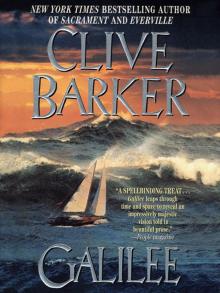 Galilee
Galilee Cabal
Cabal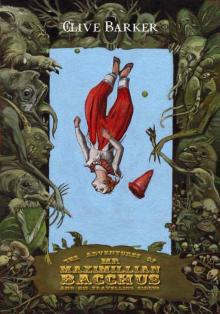 The Adventures of Mr. Maximillian Bacchus and His Travelling Circus
The Adventures of Mr. Maximillian Bacchus and His Travelling Circus Everville
Everville Books of Blood: Volume Three
Books of Blood: Volume Three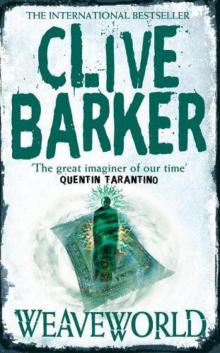 Weaveworld
Weaveworld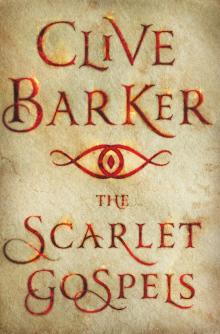 The Scarlet Gospels
The Scarlet Gospels Sacrament
Sacrament Books of Blood: Volumes 1-6
Books of Blood: Volumes 1-6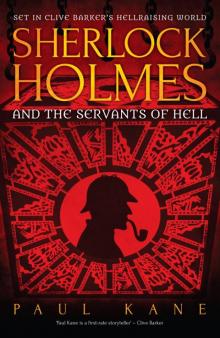 Sherlock Holmes and the Servants of Hell
Sherlock Holmes and the Servants of Hell Mister B. Gone
Mister B. Gone Imajica
Imajica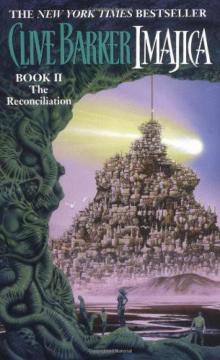 The Reconciliation
The Reconciliation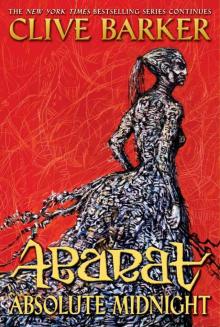 Abarat
Abarat Clive Barker's First Tales
Clive Barker's First Tales The Hellbound Heart
The Hellbound Heart The Inhuman Condition
The Inhuman Condition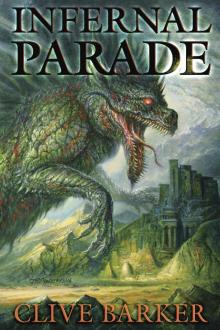 Infernal Parade
Infernal Parade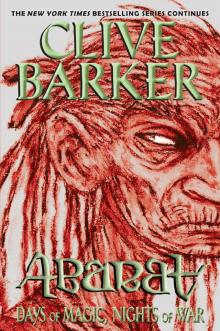 Days of Magic, Nights of War
Days of Magic, Nights of War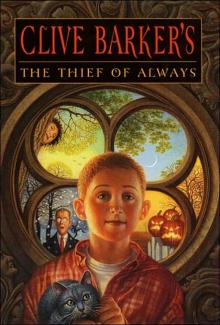 The Thief of Always
The Thief of Always Books of Blood Vol 2
Books of Blood Vol 2 The Essential Clive Barker
The Essential Clive Barker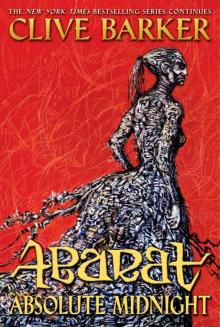 Abarat: Absolute Midnight a-3
Abarat: Absolute Midnight a-3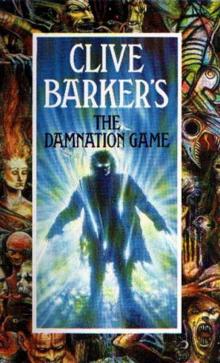 The Damnation Game
The Damnation Game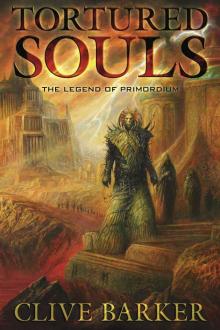 Tortured Souls: The Legend of Primordium
Tortured Souls: The Legend of Primordium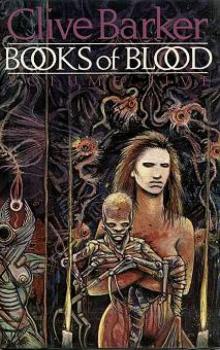 Books of Blood Vol 5
Books of Blood Vol 5 Imajica 02 - The Reconciliator
Imajica 02 - The Reconciliator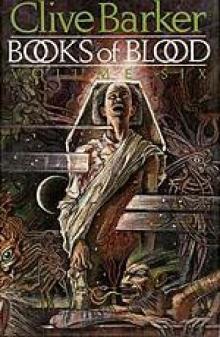 Books Of Blood Vol 6
Books Of Blood Vol 6 Imajica 01 - The Fifth Dominion
Imajica 01 - The Fifth Dominion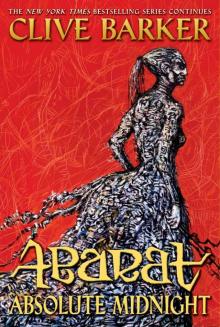 Abarat: Absolute Midnight
Abarat: Absolute Midnight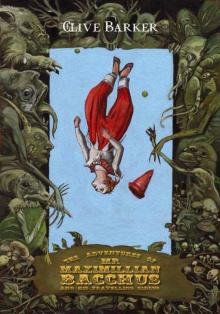 The Adventures of Mr. Maximillian Bacchus & His Traveling Circus
The Adventures of Mr. Maximillian Bacchus & His Traveling Circus Tonight, Again
Tonight, Again Abarat: The First Book of Hours a-1
Abarat: The First Book of Hours a-1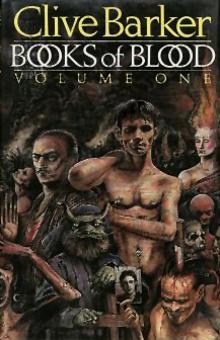 Books Of Blood Vol 1
Books Of Blood Vol 1 Age of Desire
Age of Desire Imajica: Annotated Edition
Imajica: Annotated Edition Complete Books of Blood
Complete Books of Blood Gutted: Beautiful Horror Stories
Gutted: Beautiful Horror Stories Shivers 7
Shivers 7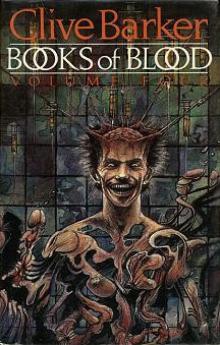 Books Of Blood Vol 4
Books Of Blood Vol 4